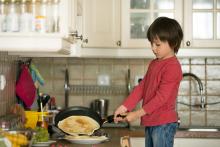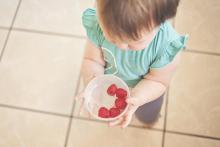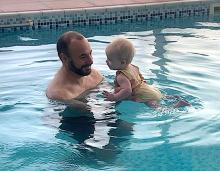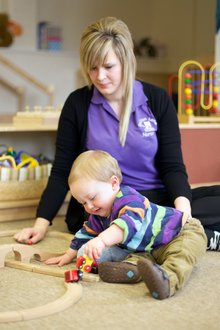It is the most natural instinct in the world to not want your child to feel hungry and preparing wholesome, nutritious meals for our babies and toddlers is the best start we can give them for a healthy future life-style.
But expert advice and guidance can be confusing and contradictory. For example, it was recently announced that fats may not be as harmful as had previously been thought and, when weaning, parents are often told that their children should be gaining weight, not losing it. So it is not surprising that, as parents, we find it hard to sift through the weight of well-intentioned but bewildering information when deciding what to do for the best.
Size does matter
Recent research has suggested that we may be over-feeding our youngsters causing weight gain which can continue throughout childhood and later in life. Even when we are offering healthy food, giving them too much may be harmful.
A study by University College, London has shown that we may not be aware of how much our children should eat, or what they dangers are of them being overweight. The report said feeding guidelines should be clearer and more specific, and that parents should be told what these are.
Experts carrying out the research compared what overweight children ate with youngsters who had a healthy weight for their age. They found that the overweight children were eating more than the others – consuming 141 calories per meal, compared with 130. So it was not that these children were getting more “bad” food, such as sweets or chocolate, than the healthy weight group, but simply that they were given more food.
Hayley Syrad, the author of the report said that for every 24 calories eaten during each meal, there is a 9% increased risk of the child becoming overweight or obese. Her findings suggested some parents were over-feeding their infants and it could be because they believed it was healthy for them to be “chubby”.
“We know that even birth weight tracks into later life,” she said. “If children are overweight when they are under two it tracks into adulthood. A bigger baby is likely to be a bigger child and then a bigger adult."
So how much should you be feeding your toddler?
There is little guidance on what a healthy portion should look like. Public Health England advises parents to offer a small helping allowing the child to ask for more if they’re still hungry. Small plates should be used for young children as this helps to prevent accidentally giving them too much.
It is also important not to try to force your child to eat everything you put in front of them, or more than they want. Playing the ‘parking the car in the garage’ or ‘bringing the plane in to land’ games might be fun, but it could be forcing food your child with food they neither want nor need.
Judy More, a nutritionist and paediatric dietician, agrees. She said that babies and young children should eat until they are full and no more. She said that some parents were prone to over-feeding because they feared their children would go hungry.
"It's the parents' responsibility to provide nutritious food, but they should allow children to eat as much they want to,” Judy said.
“Children’s appetites vary from day to day depending on how they feel and how active they are, so keep an open mind on how much they will eat. Let them decide.”
Experts also advise parents to stick to three meals a day, with healthy snacks in-between, and to encourage their children to eat slowly. Set meal-times, with the family eating together, allows you to watch your child’s food intake and to instigate conversations about healthy eating. It is also a good time to teach certain social behaviours, such as using cutlery and table manners.
Further information
http://www.infantandtoddlerforum.org/toddlers-to-preschool/portionsizes
Written for the Early Years Alliance by Dorothy Lepkowska.







